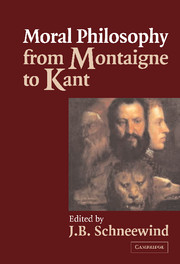Book contents
- Frontmatter
- Contents
- Preface
- Acknowledgments
- Foreword to the One-Volume Reprint
- Introduction
- PROLEGOMENA: SOME QUESTIONS RAISED
- PART I REWORKING NATURAL LAW
- Francisco Suarez
- Hugo Grotius
- Thomas Hobbes
- Richard Cumberland
- Samuel Pufendorf
- John Locke
- PART II INTELLECT AND MORALITY
- PART III EPICUREANS AND EGOISTS
- PART IV AUTONOMY AND RESPONSIBILITY
- Supplemental Bibliography
John Locke
Published online by Cambridge University Press: 05 June 2012
- Frontmatter
- Contents
- Preface
- Acknowledgments
- Foreword to the One-Volume Reprint
- Introduction
- PROLEGOMENA: SOME QUESTIONS RAISED
- PART I REWORKING NATURAL LAW
- Francisco Suarez
- Hugo Grotius
- Thomas Hobbes
- Richard Cumberland
- Samuel Pufendorf
- John Locke
- PART II INTELLECT AND MORALITY
- PART III EPICUREANS AND EGOISTS
- PART IV AUTONOMY AND RESPONSIBILITY
- Supplemental Bibliography
Summary
Introduction
Locke claimed that a deductive science of moral principles could be produced, although he himself never produced one. His epistemological and political views were so influential, however, that they gave considerable weight to the ideas about morality that Locke expressed in his various works. Those interested in the history of ethics should therefore have some acquaintance with Locke's views.
Locke was born in 1632 and educated at Oxford, where he taught for a period and then studied medicine, eventually obtaining a degree in 1674. In 1667 he took a post as physician to Lord Ashley (after 1672 the earl of Shaftesbury), whom he served in many capacities until the earl's death in 1683. Shaftesbury was a major figure in the party opposing absolutist monarchy and working to keep the throne in Protestant hands. Indeed, his intrigues led to his being tried for treason. Although he was acquitted, Shaftesbury fled England, and after the earl's death, Locke, thinking that he also was in some danger, left Oxford for Holland. He stayed there until 1689, returning when William and Mary – to whom he had been an adviser in Holland – came to the English throne.
When Locke was a student, philosophy at Oxford was still scholastic, and he was not interested in it. He studied Descartes only after he had finished his formal education. Then, during a stay in Paris Locke met a number of leading philosophical figures, among them Gassendi's disciple Bernier, who encouraged him in following an empiricist line of thought.
- Type
- Chapter
- Information
- Moral Philosophy from Montaigne to Kant , pp. 183 - 198Publisher: Cambridge University PressPrint publication year: 2002

